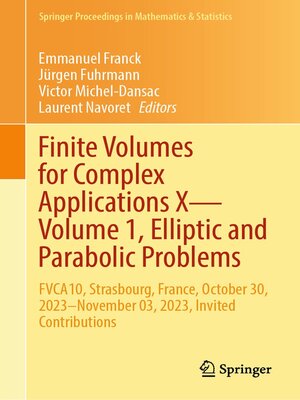Finite Volumes for Complex Applications X—Volume 1, Elliptic and Parabolic Problems
ebook ∣ FVCA10, Strasbourg, France, October 30, 2023–November 03, 2023, Invited Contributions · Springer Proceedings in Mathematics & Statistics
By Emmanuel Franck

Sign up to save your library
With an OverDrive account, you can save your favorite libraries for at-a-glance information about availability. Find out more about OverDrive accounts.
Find this title in Libby, the library reading app by OverDrive.



Search for a digital library with this title
Title found at these libraries:
| Loading... |
This volume comprises the first part of the proceedings of the 10th International Conference on Finite Volumes for Complex Applications, FVCA, held in Strasbourg, France, during October 30 to November 3, 2023.
The Finite Volume method, and several of its variants, is a spatial discretization technique for partial differential equations based on the fundamental physical principle of conservation. Recent decades have brought significant success in the theoretical understanding of the method. Many finite volume methods are also built to preserve some properties of the continuous equations, including maximum principles, dissipativity, monotone decay of the free energy, asymptotic stability, or stationary solutions. Due to these properties, finite volume methods belong to the wider class of compatible discretization methods, which preserve qualitative properties of continuous problems at the discrete level. This structural approach to the discretization of partial differential equations becomes particularly important for multiphysics and multiscale applications. In recent years, the efficient implementation of these methods in numerical software packages, more specifically to be used in supercomputers, has drawn some attention.
This volume contains all invited papers, as well as the contributed papers focusing on finite volume schemes for elliptic and parabolic problems. They include structure-preserving schemes, convergence proofs, and error estimates for problems governed by elliptic and parabolic partial differential equations.
The second volume is focused on finite volume methods for hyperbolic and related problems, such as methods compatible with the low Mach number limit or able to exactly preserve steady solutions, the development and analysis of high order methods, or the discretization of kinetic equations.






